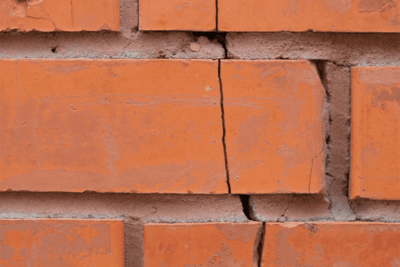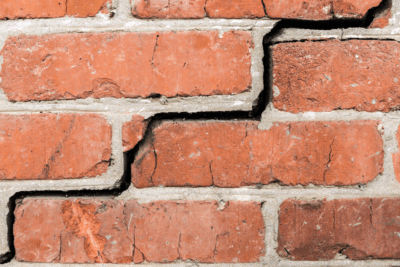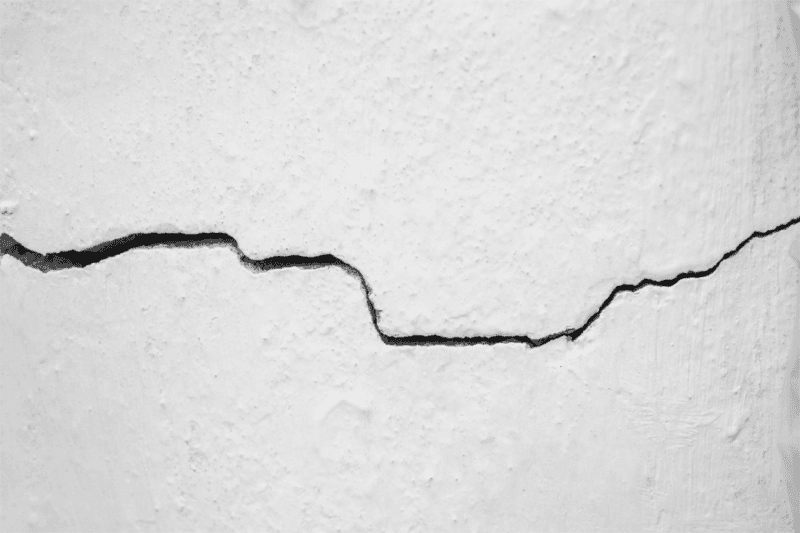
Types of Foundation Cracks: Causes and Severity
Foundation cracks are, for obvious reasons, one of the number one signs of foundation failure. However, not all foundation cracks are created the same, which means they won’t all require the same repair method—some may not require repair at all.

Here are the four most common types of foundation cracks:
VERTICAL CRACKS

Vertical cracks can appear straight up and down or within 30 degrees of vertical, and are typically caused by settlement. Because newly constructed homes can settle significantly in the first few years, vertical cracks are very common in both newly constructed and older homes.
Are vertical cracks in foundation bad?
Vertical cracks may or may not indicate structural damage. However, they can still allow water to seep into your basement or crawlspace. USS can help you repair vertical foundation cracks to ensure you don’t have to deal with a leaky basement or wet crawl space.
STAIR-STEP CRACKS

Stair-step cracks typically occur in brick, block, and masonry foundation walls, and are a classic indicator of foundation settlement. Shrinkage of the soil can leave a void beneath your foundation walls causing what is known as differential settlement, which can result in stair step cracks.
Are step cracks serious?
Stair-step cracks along mortar joints or through the actual brick are almost always a serious matter—especially if the wall is bulging or if the cracks are larger than ¼ an inch. If you notice stair-step cracks in your foundation walls, call a contractor at USS immediately for a free foundation estimate.
HORIZONTAL CRACKS

Horizontal cracks, particularly those found in basement walls, are often formed by heavy, saturated soil placing extreme amounts of pressure on your foundation. Often, the culprit is inadequate drainage and gutter systems which fail at directing rainwater away from the home. This excess water can then pool around foundation walls, causing the soil to become heavy and oversaturated. The result is known as hydrostatic pressure, which can force your foundation walls to bow or buckle inwards and eventually crack.
Are horizontal foundation cracks always bad?
With exception to horizontal cracks found above a garage door lintel, which may call for a lintel repair, horizontal cracks are typically an indicator of structural foundation damage. To restore the structural integrity of your home as soon as possible and prevent further damage, you should call a foundation repair contractor at their first sighting.
HAIRLINE, CRAZING, AND SHRINKAGE CRACKS

Hairline cracks can occur both in the concrete itself or in mortar joints between concrete blocks. These tiny cracks can appear in newly poured concrete and are likely caused by concrete shrinkage.
Should I worry about hairline cracks in my foundation?
Because hairline cracks are thin and shallow, there’s no reason to stress over them. However, you should monitor them closely for changes. If you notice them growing larger over time, you should call a contractor to perform an inspection.
Cracks in your home’s foundation are kind of like the check engine light in your car. The bright, glaring warning sign can mean anything from a loose gas cap to a faulty converter—the difference of a $20 and a $2,000 repair. Foundation cracks, similarly, can be simple cosmetic concerns or indicate severe structural damage. In both situations, you could just pray and hope that it’s nothing to worry about—or you could opt for peace of mind and potentially save yourself from the cost of more expensive repairs down the road.
Just like it’s important to get your car inspected before there are blatant signs of engine break-down, it’s important to get your foundation inspected before there are obvious signs of failure. Paying attention to warning signs, whether they come in the form of a flashing light or a fractured concrete, can help you save money and stress.
When is a Foundation Crack Serious? Here’s What to Look For:
How do you determine for yourself whether your foundation crack is serious or nothing to worry about? Though we recommend always calling a professional when you have a foundation concern (the appointment is fast and free—what’s to lose?), you may want to know how we determine whether a crack is serious enough to warrant foundation repair. Here are some things to look for when determining whether your foundation cracks are serious:

- Size: The wider the crack, the more dramatic the foundation settlement or shift.
- Depth: Cracks that are mirrored on the inside of your home and the exterior foundation wall are more serious threats to your foundation’s strength.
- Number: The more cracks that occur in your foundation, the weaker your foundation may be.
- Location: Stair-step cracks and vertical cracks that appear in the southern corners of your home typically indicate foundation movement.
Vertical Cracks vs Horizontal Cracks: Which is Worse?
In general, horizontal cracks are normally worse than vertical ones. Vertical cracks are often the result of foundation settling and are usually the easier to repair. However, vertical cracks should not be dismissed and it's recommended to schedule an inspection to evaluate the problem. Horizontal cracks usually indicate more severe issues with a foundation's integrity. One of the best things you can do when you notice foundation damage is to hire a professional to help with the process. This is especially true if you have serious horizontal cracks.
Other Interior, Exterior, and Structural Warning Signs of Foundation Failure
If you don’t spend much time in your basement or crawl space, or if your foundation walls are not easily accessible, you might need to rely on other warning signs of foundation failure. If you notice the following concerns around your home, especially if in conjunction with foundation cracks, you should call a contractor to review your home for foundation failure:

- Sticking doors and windows
- Separation of foundation walls from soil
- Trim pulled away from windows
- Uneven floors
- Rotten wood support beams
- Fireplace rotating away from the roofline
- Cracks around doors and windows
- Wide cracks in drywall
What Causes a House Foundation to Crack?
Though each type of foundation crack has unique causes, here is a summary of the most common causes of foundation cracks:

- Concrete Shrinkage: As concrete and mortar cure, the top layer can dry rapidly and produce web-like cracks on the material’s surface. Cracks caused by shrinkage don’t compromise the strength or integrity of your foundation.
- Settlement: When the soil beneath your home’s foundation compresses or washes away, your foundation settles into the new depth. Settlement can be caused by expansive soils (which shrink when they are dry), soil washout due to heavy rain, or the compression of poorly compacted, loose fill-soil.
- Soil Pressure and Hydrostatic Pressure: Both expansive soil and over-saturated soil can put a large amount of pressure against your foundation wall. If this pressure is too great, it can cause the foundation to bow or buckle and form horizontal or diagonal cracks.
- Construction Issues: Sometimes, foundation cracks are simply due to construction issues. If concrete is weak, footings are undersized, reinforcement is inadequate, or fill soil is loose, your concrete foundation walls can suffer.
How to Repair Foundation Cracks

So far, we’ve discussed how to diagnose foundation cracks and detect foundation problems, as well as how to determine potential causes. Next up, we’ll discuss foundation crack repair and prevention methods.
How to Fix Foundation Cracks and Prevent Future Damage
Repairing foundation cracks is often a more extensive process than just sealing cracks with an epoxy injection, as this only addresses the cosmetic and leaking concerns. Cracks that occur due to soil pressure, hydrostatic pressure, or settlement need a foundation repair method that fixes the problem at its source. This sometimes requires installing piers, anchors, nails, or piles to stabilize the foundation and soil—preventing foundation failure from recurring.
How to Seal Concrete Foundation Cracks
After the structural integrity of your foundation is addressed and restored, we’ll discuss options for sealing any remaining cracks in your foundation to ensure leaking walls don’t also become a concern. We always aim for maximum closure when we stabilize your foundation, but caulking or remortaring is an option for providing added strength and peace of mind.
How to Fix Foundation Cracks by Yourself
Though there are many DIY instructions online for how to fix foundation cracks by yourself, we recommend having a foundation repair specialist first look at your home for structural damage before you attempt home repairs.
How Much Does Foundation Repair Cost?
The cost of foundation repair will depend on the kind of damage your foundation has incurred and what caused it. To help you better plan for these expenses, USS offers free foundation repair estimates to all of our clients.
Foundation Repair Financing
Foundation repair can be unplanned and expensive, making it challenging to fund. At USS, we offer foundation repair financing to help homeowners make necessary home improvements with greater flexibility and less financial stress. We have low payment options available through EnerBank.
Call United Structural Systems for Foundation Crack Repair
If you’re concerned about cracks in your home’s foundation, call United Structural Systems to schedule a free foundation estimate today! We’ll help you determine the cause of your foundation problems, as well as guide you towards the best repair method.
Hear from happy customers
-
“I am thankful for Ben and USS for the efficiency, professionalism, and skills that they provide to their customers. You forever have a client with me!” Reena P.
-
“Robert Elam with USS is a wealth of knowledge and an incredible asset to all professionals that need this level of expertise in their corner.” Monte Mohr/Owner/Realty ONE Group Music City

We're the right choice.
-
Lifetime GuaranteeAt no additional charge, we offer transferable lifetime warranties on our foundation repair and waterproofing services.
-
An Experienced Team
We’ve worked with over 25,000 customers in Tennessee and Kentucky. Many of our team members have been with us for 5, 10, 15 years or longer.
-
Hundreds of 5-Star ReviewsOur customer reviews speak for themselves. Click here to check them out.
call for a free consultation.
-
25+ Years and CountingWe’ve been serving residential and commercial customers since 1994.
-
Payment & Financing OptionsWe don’t ask for payment until the repairs are completed. We offer financing plans, accept major credit cards and personal checks.
-
We Won't Sell You An Unnecessary RepairIf your foundation doesn’t need a repair, we’ll let you know.

Contact us today for your free estimate!
afterhours & weekends: we will reach out to schedule your appointment asap during our regular hours (M-T: 8am - 5pm, F: 8AM - 4PM)For Huntsville, AL requests, please visit our sister company at oxfoundations.com.
















